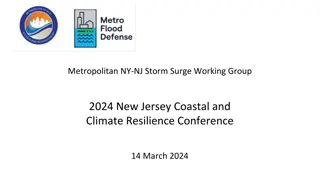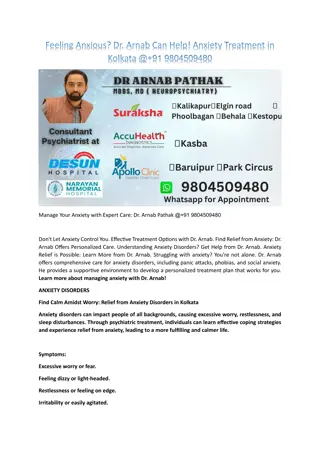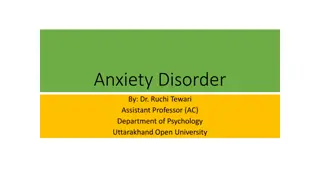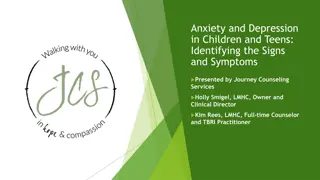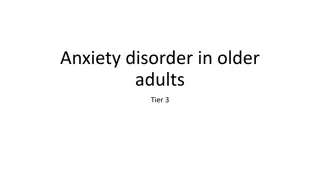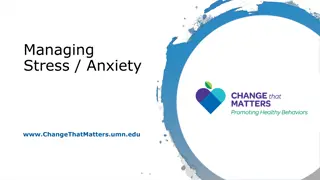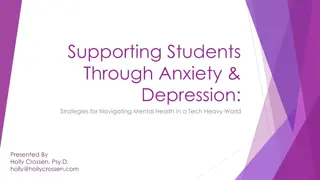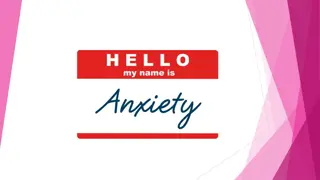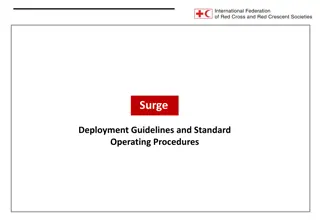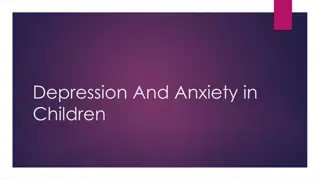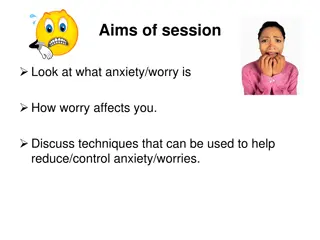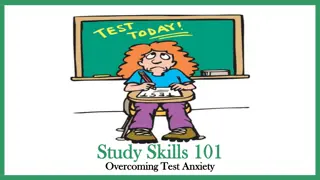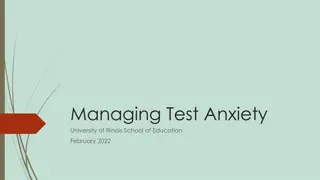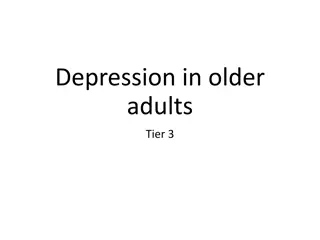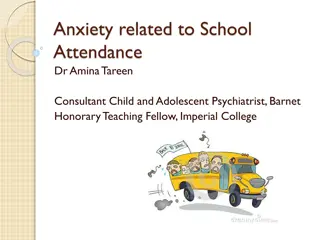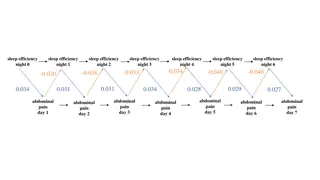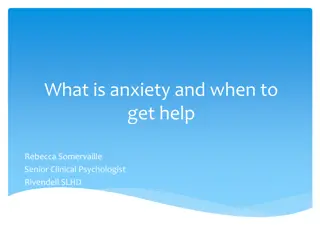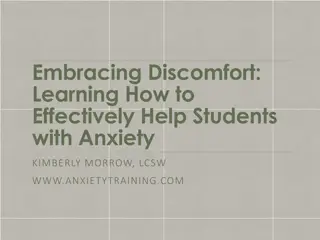Managing Anxiety and Depression Amid the Pandemic: Strategies for Rebuilding Surge Capacity
Amid the challenges of the pandemic, it's crucial to recognize signs of anxiety and depression, triggers, and the concept of surge capacity. Understanding how to refuel and rebuild this capacity is key to maintaining mental well-being during these uncertain times. Clinician Maria Green provides insights and strategies to help individuals navigate their emotions and regain control.
Uploaded on Jul 20, 2024 | 0 Views
Download Presentation

Please find below an Image/Link to download the presentation.
The content on the website is provided AS IS for your information and personal use only. It may not be sold, licensed, or shared on other websites without obtaining consent from the author. Download presentation by click this link. If you encounter any issues during the download, it is possible that the publisher has removed the file from their server.
E N D
Presentation Transcript
PANDEMIC ROLLERCOASTER TAKING THE CONTROL BACK Maria Green, LCSW Clinician at CJR Wellness Center 860-519-9491 mgreen@cjryouth.org
ANXIETY/DEPRESSION AND SURGE CAPACITY Signs of Anxiety: * Feeling restless, wound-up, or on-edge * Being easily fatigued * Having difficulty concentrating; mind going blank * Being irritable * Having muscle tension * Difficulty controlling feelings of worry * Having sleep problems, such as difficulty falling or staying asleep, restlessness, or unsatisfying sleep * Heart racing, sweaty palms, tightness in your chest
ANXIETY/DEPRESSION AND SURGE CAPACITY Anxiety triggers: * uncertainty/unknown * change * conflict * volatility * feeling like something is out of your control * trauma reminders * feeling conflicted or guilty because you ve appreciated the slower pace of life or reduced social interactions. Long term anxiety can lead to depression.
ANXIETY/DEPRESSION AND SURGE CAPACITY Signs of depression: * depressed or sad mood * reduced interest or pleasure in activities once enjoyed * loss of sexual desire * changes in appetite/unintentional weight gain or loss * sleeping too much or too little * agitation, restlessness, irritability * slowed movement and speech * fatigue or loss of energy * feelings of worthlessness or guilt * difficulty thinking, concentrating, or making decisions * recurrent thoughts of death or suicide, or an attempt at suicide
ANXIETY/DEPRESSION AND SURGE CAPACITY What is surge capacity ? The concept of surge capacity refers to an individual s ability to adapt to survive a short-term, intensely stressful situation. When the pandemic began, my surge capacity was got me cleaning and organizing and buying canned goods. I was feeling energized and ready to tackle the storm! However, as the year continued and months dragged on the surge capacity diminished. People may have started feeling fatigued by all the changes and lacking patience for keeping up with the long haul. You may have pushed yourself to keep up emotionally and psychologically but at some point for most of us our surge capacity got used up.
HOW TO REFUEL AND REBUILD * be aware of what you are surrounding yourself with news, social media, toxic relationships, etc * Observe your input and observe your environment * What is in your control vs out of your control do you focus on those things that feel out of your control?
REFUEL AND REBUILD - what are warning signs or signs that you need more than you are getting right now? - define your supports people, places, activities - define what is in your control vs out of your control - take time for stillness and silence - take time for movement - take time in nature
RESOURCES Website: DailyOm.com universal approach to holistic living for your mind, body and spirit. Podcasts: The Happiness Lab Dr Laurie Santos is a professor at Yale who studies the science of happiness Psychologists Off The Clock Four clinical psychologists come together to bring you ideas from psychology that can help you flourish in your work, relationships and health Mentally Flexible Tom Parkes topics related to mental health, psychology, and creativity
RESOURCES Apps: Down Dog Yoga customizable yoga app Happify activities to overcome negative thoughts, stress, and life s challenges Woebot self-care coach who offers insights, practical techniques, problem solving and support Headspace A guide for mindfulness in your everyday life guided meditations Calm A mindfulness app that provides sleep stories, breathing programs, stretching exercises, and relaxing music. Books: Reality Slap by Russ Harris A book that teaches you how to find peace in the midst of your pain and calm in the midst of chaos Unwinding Anxiety by Dr. Judson Brewer A step by step plan to break the cycle of worry and fear that drives anxiety and addictive habits
RESOURCES Connecticut Junior Republic (CJR) Wellness Center Jennifer Grant, Director of Behavioral Health jgrant@cjryouth.org 860-567-9423 x303 Maria Green, Lead Clinician, New Britain office mgreen@cjryouth.org 860-519-9491 Psychologytoday.com
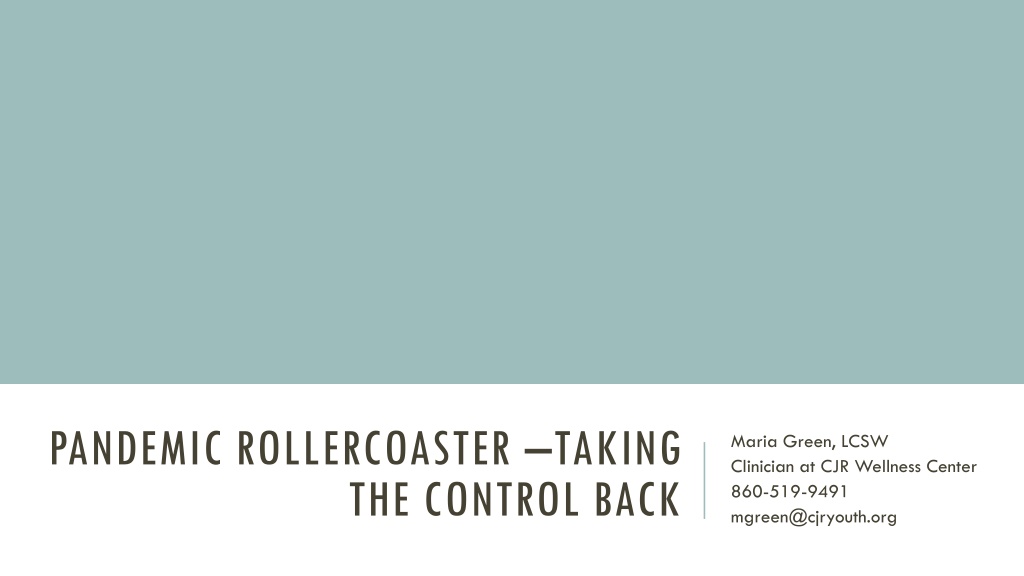
 undefined
undefined





